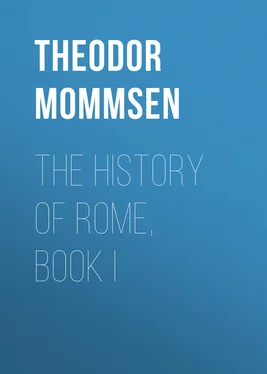Theodor Mommsen - The History of Rome, Book I
Здесь есть возможность читать онлайн «Theodor Mommsen - The History of Rome, Book I» — ознакомительный отрывок электронной книги совершенно бесплатно, а после прочтения отрывка купить полную версию. В некоторых случаях можно слушать аудио, скачать через торрент в формате fb2 и присутствует краткое содержание. Жанр: foreign_prose, История, foreign_edu, foreign_antique, на английском языке. Описание произведения, (предисловие) а так же отзывы посетителей доступны на портале библиотеки ЛибКат.
- Название:The History of Rome, Book I
- Автор:
- Жанр:
- Год:неизвестен
- ISBN:нет данных
- Рейтинг книги:5 / 5. Голосов: 1
-
Избранное:Добавить в избранное
- Отзывы:
-
Ваша оценка:
- 100
- 1
- 2
- 3
- 4
- 5
The History of Rome, Book I: краткое содержание, описание и аннотация
Предлагаем к чтению аннотацию, описание, краткое содержание или предисловие (зависит от того, что написал сам автор книги «The History of Rome, Book I»). Если вы не нашли необходимую информацию о книге — напишите в комментариях, мы постараемся отыскать её.
The History of Rome, Book I — читать онлайн ознакомительный отрывок
Ниже представлен текст книги, разбитый по страницам. Система сохранения места последней прочитанной страницы, позволяет с удобством читать онлайн бесплатно книгу «The History of Rome, Book I», без необходимости каждый раз заново искать на чём Вы остановились. Поставьте закладку, и сможете в любой момент перейти на страницу, на которой закончили чтение.
Интервал:
Закладка:
The summits of the last offshoots of the Sabine range form natural fastnesses of the Latin plain; and the canton-strongholds there gave rise at a later period to the considerable towns of Tibur and Praeneste. Labici too, Gabii, and Nomentum in the plain between the Alban and Sabine hills and the Tiber, Rome on the Tiber, Laurentum and Lavinium on the coast, were all more or less ancient centres of Latin colonization, not to speak of many others less famous and in some cases almost forgotten.
The Latin League
All these cantons were in primitive times politically sovereign, and each of them was governed by its prince with the co-operation of the council of elders and the assembly of warriors. Nevertheless the feeling of fellowship based on community of descent and of language not only pervaded the whole of them, but manifested itself in an important religious and political institution—the perpetual league of the collective Latin cantons. The presidency belonged originally, according to the universal Italian as well as Hellenic usage, to that canton within whose bounds lay the meeting-place of the league; in this case it was the canton of Alba, which, as we have said, was generally regarded as the oldest and most eminent of the Latin cantons. The communities entitled to participate in the league were in the beginning thirty—a number which we find occurring with singular frequency as the sum of the constituent parts of a commonwealth in Greece and Italy. What cantons originally made up the number of the thirty old Latin communities or, as with reference to the metropolitan rights of Alba they are also called, the thirty Alban colonies, tradition has not recorded, and we can no longer ascertain. The rendezvous of this union was, like the Pamboeotia and the Panionia among the similar confederacies of the Greeks, the "Latin festival" (-feriae Latinae-), at which, on the "Mount of Alba" (-Mons Albanus-, -Monte Cavo-), upon a day annually appointed by the chief magistrate for the purpose, an ox was offered in sacrifice by the assembled Latin stock to the "Latin god" (-Jupiter Latiaris-). Each community taking part in the ceremony had to contribute to the sacrificial feast its fixed proportion of cattle, milk, and cheese, and to receive in return a portion of the roasted victim. These usages continued down to a late period, and are well known: respecting the more important legal bearings of this association we can do little else than institute conjectures.
From the most ancient times there were held, in connection with the religious festival on the Mount of Alba, assemblies of the representatives of the several communities at the neighbouring Latin seat of justice at the source of the Ferentina (near Marino). Indeed such a confederacy cannot be conceived to exist without having a certain power of superintendence over the associated body, and without possessing a system of law binding on all. Tradition records, and we may well believe, that the league exercised jurisdiction in reference to violations of federal law, and that it could in such cases pronounce even sentence of death. The later communion of legal rights and, in some sense, of marriage that subsisted among the Latin communities may perhaps be regarded as an integral part of the primitive law of the league, so that any Latin man could beget lawful children with any Latin woman and acquire landed property and carry on trade in any part of Latium. The league may have also provided a federal tribunal of arbitration for the mutual disputes of the cantons; on the other hand, there is no proof that the league imposed any limitation on the sovereign right of each community to make peace or war. In like manner there can be no doubt that the constitution of the league implied the possibility of its waging defensive or even aggressive war in its own name; in which case, of course, it would be necessary to have a federal commander-in-chief. But we have no reason to suppose that in such an event each community was compelled by law to furnish a contingent for the army, or that, conversely, any one was interdicted from undertaking a war on its own account even against a member of the league. There are, however, indications that during the Latin festival, just as was the case during the festivals of the Hellenic leagues, "a truce of God" was observed throughout all Latium; 18 18 The Latin festival is expressly called "armistice" (-indutiae-, Macrob. Sat. i. 16; —ekecheipiai—, Dionys. iv. 49); and a war was not allowed to be begun during its continuance (Macrob. l. c.)
and probably on that occasion even tribes at feud granted safe-conducts to each other.
It is still less in our power to define the range of the privileges of the presiding canton; only we may safely affirm that there is no reason for recognizing in the Alban presidency a real political hegemony over Latium, and that possibly, nay probably, it had no more significance in Latium than the honorary presidency of Elis had in Greece. 19 19 The assertion often made in ancient and modern times, that Alba once ruled over Latium under the forms of a symmachy, nowhere finds on closer investigation sufficient support. All history begins not with the union, but with the disunion of a nation; and it is very improbable that the problem of the union of Latium, which Rome finally solved after some centuries of conflict, should have been already solved at an earlier period by Alba. It deserves to be remarked too that Rome never asserted in the capacity of heiress of Alba any claims of sovereignty proper over the Latin communities, but contented herself with an honorary presidency; which no doubt, when it became combined with material power, afforded a handle for her pretensions of hegemony. Testimonies, strictly so called, can scarcely be adduced on such a question; and least of all do such passages as Festus -v. praetor-, p. 241, and Dionys. iii. 10, suffice to stamp Alba as a Latin Athens.
On the whole it is probable that the extent of this Latin league, and the amount of its jurisdiction, were somewhat unsettled and fluctuating; yet it remained throughout not an accidental aggregate of various communities more or less alien to each other, but the just and necessary expression of the relationship of the Latin stock. The Latin league may not have at all times included all Latin communities, but it never at any rate granted the privilege of membership to any that were not Latin. Its counterpart in Greece was not the Delphic Amphictyony, but the Boeotian or Aetolian confederacy.
These very general outlines must suffice: any attempt to draw the lines more sharply would only falsify the picture. The manifold play of mutual attraction and repulsion among those earliest political atoms, the cantons, passed away in Latium without witnesses competent to tell the tale. We must now be content to realise the one great abiding fact that they possessed a common centre, to which they did not sacrifice their individual independence, but by means of which they cherished and increased the feeling of their belonging collectively to the same nation. By such a common possession the way was prepared for their advance from that cantonal individuality, with which the history of every people necessarily begins, to the national union with which the history of every people ends or at any rate ought to end.
CHAPTER IV
The Beginnings of Rome
Ramnes
About fourteen miles up from the mouth of the river Tiber hills of moderate elevation rise on both banks of the stream, higher on the right, lower on the left bank. With the latter group there has been closely associated for at least two thousand five hundred years the name of the Romans. We are unable, of course, to tell how or when that name arose; this much only is certain, that in the oldest form of it known to us the inhabitants of the canton are called not Romans, but Ramnians (Ramnes); and this shifting of sound, which frequently occurs in the older period of a language, but fell very early into abeyance in Latin, 20 20 A similar change of sound is exhibited in the case of the following formations, all of them of a very ancient kind: -pars—portio-, -Mars- -Mors-, -farreum- ancient form for -horreum-, -Fabii- -Fovii-, -Valerius- -Volesus-, -vacuus- -vacivus-.
is an expressive testimony to the immemorial antiquity of the name. Its derivation cannot be given with certainty; possibly "Ramnes" may mean "the people on the stream."
Интервал:
Закладка:
Похожие книги на «The History of Rome, Book I»
Представляем Вашему вниманию похожие книги на «The History of Rome, Book I» списком для выбора. Мы отобрали схожую по названию и смыслу литературу в надежде предоставить читателям больше вариантов отыскать новые, интересные, ещё непрочитанные произведения.
Обсуждение, отзывы о книге «The History of Rome, Book I» и просто собственные мнения читателей. Оставьте ваши комментарии, напишите, что Вы думаете о произведении, его смысле или главных героях. Укажите что конкретно понравилось, а что нет, и почему Вы так считаете.











